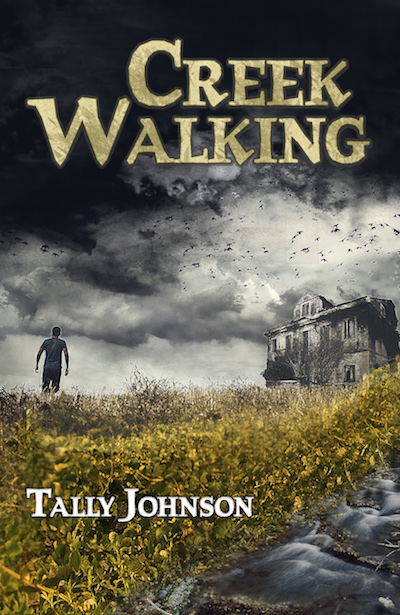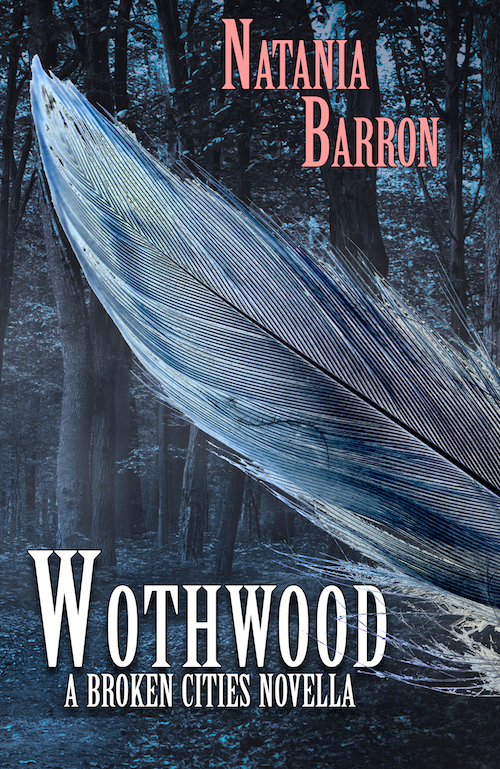
by john | Mar 31, 2017 | Book Spotlight, Evolution, Writing
Natania Barron is a multi-talented amazing human. She’s a mom, a writer, an audiobook narrator, and a badass cover designer. She is responsible for the covers for Wothwood, Into the Mystic, 85 North, and a bunch of upcoming Falstaff Books releases. Go buy her shit!

Wothwood: Where did you come up with the idea?
It’s pretty corny, but the seeds of Wothwood were planted in a dream.
Generally speaking, I’m a pretty vivid dreamer. I tend to dream on an epic scale, and I’ve slayed a few dragons in my time.
This was different, though. In this dream, a son was mourning his father, a ruler of some kind. I was the son, and the connection I had to my father was intense. Unlike the cliched relationships of fantasy novels, this lord and his heir were deeply connected. That feeling was very real, the world cast in a blue twilight. I started a Pinterest board called “The Hand of the Father” and put it on the back burner for a while.
Even though I started out writing heroic fantasy, it had been a long time since I’d written one. But this idea, really this intensity from the dream, stayed with me.As the months passed, the world of Wothwood began to take shape. I was preoccupied with this concept of frontier fantasy — sort of the opposite of Tolkien where the world is moving on and feels very explored — where the edges of the world are still wild and being discovered. I wanted the land itself to have a character, and so the Wothwood itself came to be.
Next came the character of Braig, who was a take on the young man in my dream, the one that should be the hero, but isn’t. In the story, the prologue begins right after Braig’s father’s funeral. Braig is a complex character throughout the story, and has a rather villainous past n some ways, and while the relationship with his father didn’t end up in the novella directly, I wanted him to have that emotional connection in the background.
Aoda came next, and I wanted to tell a story from a woman with the cards stacked against her. As a medievalist, I have always been aware of how hard life was for many people in time without medicine and vaccinations. Aoda wears the scars of syphillis, and people judge her immediately because she’s so ugly.
Glannon started out as just a bit of a plot device in the prologue, but ended up being the third POV in Wothwood and essential to the eventual story. Unlike powerful characters in much of fantasy who spend their whole time trying to win power, Glannon starts off with the power, and thirsts for more while questioning everything around her.
Really, the emotion from the initial dream is something that I tried to wind into the story as a whole. I wanted character emotions to be as vivid as the backdrop to the wood itself.
You can (and should) pick up Wothwood by clicking on this link – it’ll ask you what kind of e-reader you want to use, and then it’ll take you to that store!
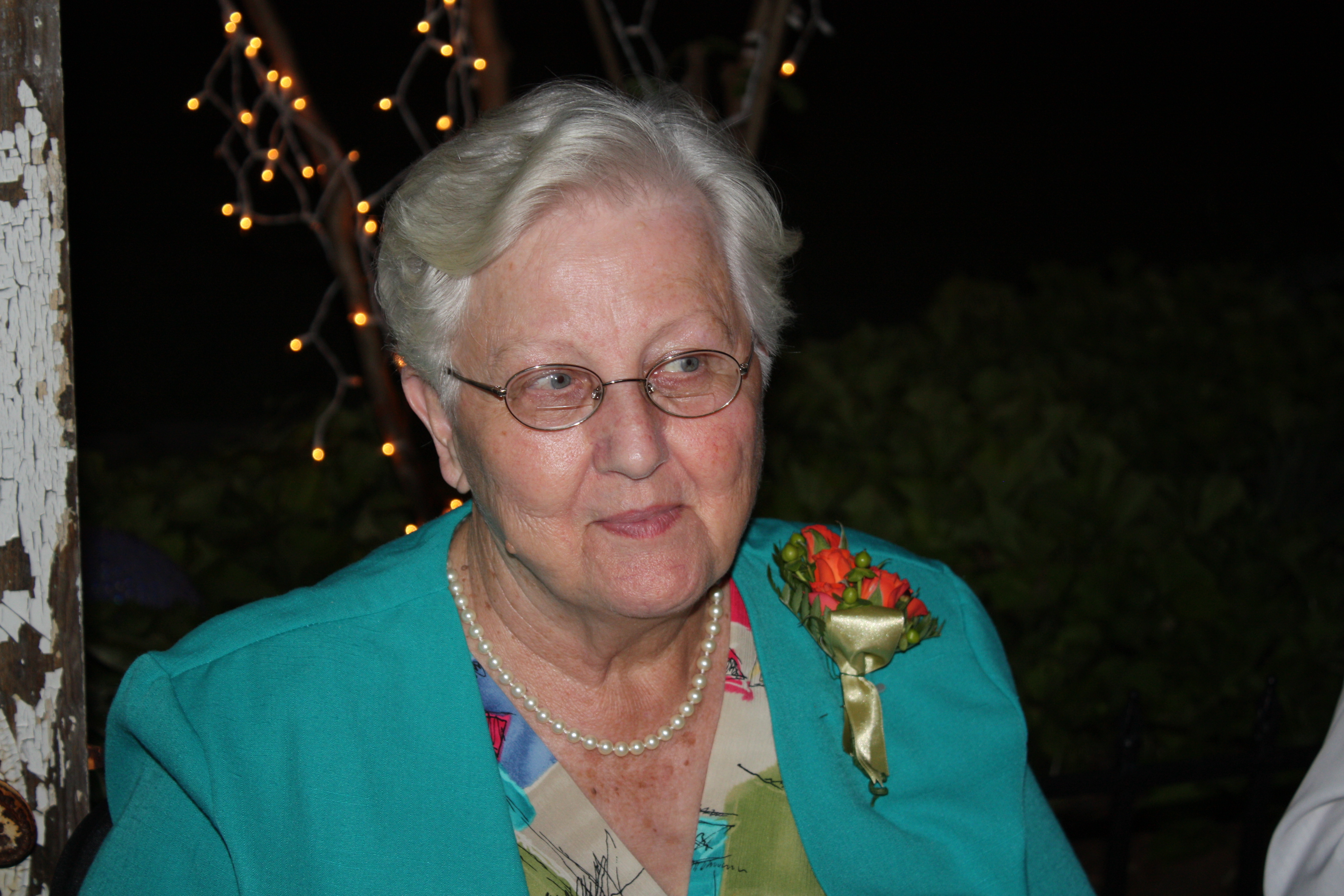
by john | Mar 27, 2017 | Amazing Grace, Fiction, Serialized Fiction, Writing
This is the latest chapter of a new novel that I’m serializing here. I release a new chapter every Monday. If you need to catch up, you can CLICK HERE.
Chapter 7
I walked over to the ghost and tried to speak to her without it being obvious to the dozen people standing behind the police cordon a dozen yards away that I was talking to empty air. It’s not an easy task, but it’s one that I have somewhat mastered over the years.
“What’s wrong, sweetie? You look like somebody just ran over your dog.” I realized as soon as the words crossed my lips that it wasn’t the most polite way of talking to a dead child who just found out that her best friend is dead, too. But there aren’t any instruction manuals for my kind of life, and I couldn’t take it back, so I just had to roll with it.
“Where’s Shelly?” Jenny asked, glowing tears rolling down her face. This was a new one on me. I’d seen ghosts angry, and sad, and even seen a couple of them scared of what was coming next, but I’d never seen one cry before. But here she was, sobbing just like you’d expect a girl whose best friend’s car just got pulled out of a lake to do. Her tears weren’t solid, of course, but they were part of her, a little tiny piece of Jenny’s soul cascading down her cheeks, cutting little trails of faintly glowing light across her shimmering visage.
“What do you mean, where’s Shelly?” I asked. I didn’t want to come off as crass and say that she was on the stretcher being loaded into the back of the ambulance, where do you think she is, you idiot, but that’s kinda what I was thinking.
“I don’t see her. I could see Sheriff Johnny, and I’ve seen a couple of other ghosts as I’ve been walking through town since I…since we first met. But I don’t see Shelly. Where is she?”
I looked around. The child had a good point. I didn’t see Shelly, either. Far as I could tell, Jenny was the only ghost at John D. Long Lake, and I was powerful glad of that. I didn’t relish the idea of telling Shelly that she was dead, especially if it had happened as recently as I expected it had. And worse than that, I sure didn’t want to run into the poor Smith children if they happened to be lingering all these years. I didn’t expect them to, not after all this time, but you never know. Some people have powerful attachments to places, and some people have powerful reasons for wanting to see justice done. None of that is normal for little kids, but there’s no hard and fast rules about the afterlife.
“I don’t see her, sweetie. Maybe she’s not here.”
“Why wouldn’t she be here? Where would she be?” Jenny was starting to get more upset, and her sadness was turning to anger, which was starting to stir up the rocks and dust around her feet. I stepped back and took a look around. We hadn’t drawn much attention yet, everybody was still focused on the macabre ceremony of loading poor Sherry’s body into the ambulance, but that ritual was almost complete, and we would be the most interesting thing by far in a minute or so.
“Jenny, I need you to calm down,” I said in my reassuring teacher voice. It’s different from the steely tone I used on Cracker earlier, but it still got through to the distraught child. A couple of pebbles dropped to the ground as she stopped rocking back and forth and focused on me.
“That’s good,” I said, keeping my voice low and calm. “Not everybody stays around after their bodies die, not even people who are killed or have a good reason to stay. It may be that Shelly didn’t have any great desire to see justice done for herself, or maybe she was just okay with moving on.”
“But…then why am I still here?” She looked up at me, more tears flowing down her face. She was calmer now, but the pain in her voice was heartbreaking.
“I don’t know, darlin’,” I said. “I have no idea what makes one person linger and one person pass on to the other side. If I did, I’d be able to help people move on a lot faster, I think.”
“Is that what you’re trying to do with me? Help me move on?”
“That’s the ultimate goal, isn’t it?” I asked. “You don’t want to stick around Lockhart dead forever, do you? I want to find out who killed you, so he or she doesn’t hurt anybody else, but I also want you to be able to go to your rest.”
“You mean Heaven,” the girl said with the firm conviction of a Protestant teenager that’s never questioned her faith for even one second.
I had no such convictions anymore, unfortunately. “I mean whatever you think I mean, honey. I think it’s probably a little different for everybody, and I’m pretty sure there’s not a lot of harps involved, but I know that whatever’s on the other side waiting for you, it’s a damn sight better than walking around talking to an old woman who’s going to get locked up in a room with padded walls if she keeps standing on the boat landing talking to thin air.”
Jenny smiled and sniffed. She was a cute little thing, even dead and weepy. “Thank you, Ms. Lila. I still don’t know why Shelly wouldn’t want to stick around and find her killer, but I reckon we can take care of that for her.”
“I expect we can,” I agreed. “Now let’s go see if the sheriff has any ideas on how we can do that.”
I walked back over to the car, where Sheriff Dunleavy had just raised the hood. I stuck my head under there beside him and said, “I think that’s the engine, Sheriff.”
“Thank you, Lila Grace. I’m no mechanic, but I think you’re right.”
“Is there anything in the engine that will tell us who killed this child?” I asked.
“Not that I can see,” he replied.
“Has anything been tampered with, like on the TV shows? Brake line cut, anything like that?”
He pointed to a square thing sitting on top of another thing. “That’s the master cylinder. It looks fine. I can’t see where anything was tampered with there.”
“Does that have anything to do with the brake lines?” I asked.
“You don’t know anything about cars, do you, Lila Grace?”
“I know where the gas goes in, I know to change the oil in my truck every five thousand miles, and I know to change my tires every three years. Anything past that, I ask Clyde. His nephew Brownie runs a service station and takes care of all my automotive needs.”
“Then why do you keep asking me about the brake lines?” the sheriff asked.
“On the TV shows, whenever two people poke their heads under the hood of a car that somebody died in, they always come out and say that the brake lines were cut. I just wanted to see if that happens in real life, too.”
“You watch too much NCIS, Lila Grace.”
“That may be, Sheriff, but I can’t help it. That Mark Harmon is just adorable. I like the New Orleans one, too. The LA show is okay, but I don’t like those actors as much. They’re too pretty.”
“Well, nobody cut any brake lines on this car,” the sheriff said, straightening up. I followed suit, and he slammed the hood down, motioning for Clyde to load the car onto his wrecker. “In fact, as far as I can see here, the car was in perfect working order before it went into the lake.”
“So why did it go into the lake?” I asked.
“Well, somebody wanted it to go into the lake. That’s why they drove it in there.”
“I reckon what we have to do next is find out who.”
“Yeah, that’s not the worst thing we have to do next.” I looked at the sheriff, and his face was grim.
“Oh,” I said, my voice soft. “Do you want me to go with you?”
“Do you have any particular connection with the family?”
“No,” I said. “I know them, but only to speak in the grocery store. We don’t go to church together, so I never had Shelly in any of my Sunday School or Vacation Bible School classes.”
“Then you’d better leave this to me. I don’t suppose she’s…” he waved a hand around in the air.
“No, she’s nowhere to be seen, Sheriff. I think she has already moved on.”
“Pity,” he said. “Maybe she could tell us something about the bastard that did this. Pardon my French.”
“Bastard isn’t French, Sheriff. Merde is French, and I won’t bruise if you cuss around me.”
“Just the same, I’ll try to keep it clean. Feels like cussing in front of my mama. Just ain’t natural.”
“I’m pretty sure your mama knows those words, too, Sheriff.”
“Oh, I can guarantee you she does. My daddy was a Marine. She’s heard them all.”
“Was a Marine? It was my understanding that you’re always a Marine.”
“He passed two years ago. That’s the only way you stop being a Marine, Ms. Carter. You stop being.”
“Well, I’m sorry, Sheriff. The loss of a parent is a hard thing to get over, no matter when it comes.”
“I reckon the loss of a child is, too,” he said. “If you’ll excuse me, I’m going to go make this the worst day of a couple parents’ life.”
“I’ll meet you at the station in the morning and we can talk about the fingerprints on that flashlight in Jenny’s basement and look for connections between these girls’ deaths.” I watched him walk to his car and throw his hat on passenger seat. I did not envy the big man his duties this afternoon.
“Do you think the same person that killed me killed Shelly?” Jenny asked. I didn’t hear her come up, but she only made noise if she tried to, or spoke.
“I don’t think it’s a coincidence that two best friends in a town of less than ten thousand people wound up dead within five days of each other. Do you?”
“No, I guess not.”
“Then let’s go back to your house. I need to talk to your mama and daddy. Without that son of a bitch preacher of yours looming over us.”
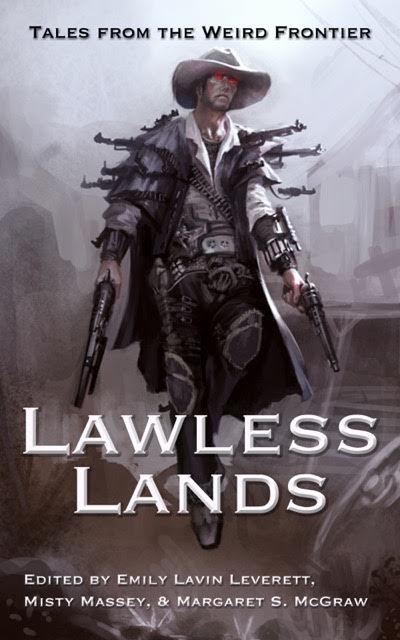
by john | Mar 24, 2017 | Evolution, Guest Blogs, Writing
Nicole Givens Kurtz is awesome on so many levels. She’s a mother, a writer, and a publisher, and an all-around cool person. She sent me an awesome essay – so I’m very happy to run this as the first Evolution post.
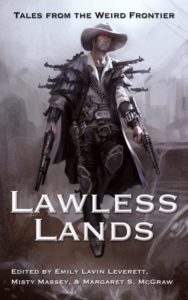 Weird Westerns are a sub-genre of speculative fiction. I was first introduced to this sub-genre when I lived in the Southwest and attended MilehiCon. While there, I met David B. Riley and his publishing company, Science Fiction Trails. He and Laura Givens were working on an anthology of weird westerns. Excited by the idea of creating a diverse populous in the old west, I went home and wrote a short story. I submitted “Justice” to them and it was accepted. The story appeared in Six Guns Straight from Hell.
Weird Westerns are a sub-genre of speculative fiction. I was first introduced to this sub-genre when I lived in the Southwest and attended MilehiCon. While there, I met David B. Riley and his publishing company, Science Fiction Trails. He and Laura Givens were working on an anthology of weird westerns. Excited by the idea of creating a diverse populous in the old west, I went home and wrote a short story. I submitted “Justice” to them and it was accepted. The story appeared in Six Guns Straight from Hell.
It is from those stories in Six Guns that I fell in love with weird westerns. I was won over by the dynamics of steampunk, aliens, and of course, magic in the west. Will Smith’s turn in The Wild Wild West movie conjured up all the western episodes from my past. The fact of a black man in the west, saving it from destruction, stuck to me, despite its silliness. For once, the hero wore my color skin and he was doing it with guns and a dark, black hat—no white hat heroes here!
Recently two of my short stories have appeared in Wolfsinger Publication’s diverse weird western anthologies, Lost Trails Volumes I and II. Most of my southwest stories are weird. I write often about my time in the Four Corners area, but also focusing solely on people not commonly represented, Native Americans and African Americans.
My love affair with weird westerns extend beyond my stories.
I’m a huge fan of Stephen King’s The Dark Tower and anime favorite, Cowboy Bebop. Other weird westerns favorites include Trigun, Samurai 7, and Samurai Champloo. What I enjoy about each of these titles are the diverse casting, the way the west was interpreted, and the dynamics—desperation–between all of the characters.
I’m just as big a fan of original westerns as I am of the weird kind. My mother used to spend Saturday evenings watching Clint Eastwood movies. While some people love The Magnificent Seven, I enjoy The Outlaw Josey Wells and others. Still, Unforgiven, is perhaps the one I love the most. I always cry when Ned dies. Yes, there are subtle commentary about the black cowboy dying in the film, but it’s Morgan Freeman’s portrayal of Ned that really drives my emotional attachment to him. It’s also Eastwood’s grief-stricken agony that tugs on my heart strings when he orders the town people to ‘take care of Ned.’
And the threat that if they don’t, he will come back for them.
Look for my weird western stories in two upcoming anthologies. One if Baen’s Straight Outta Tombstone and the other is Lawless Land available from Falstaff. Both anthologies have some of the best writers in speculative fiction are contributing! Gail Martin, Misty Massey, and John Hartness to name a few. I’m lucky to discover weird westerns on this side of the Southwest. There are great rewards for those who haven’t contributed. So stop by and boost the signal with a great big YeeHAW!
If you’re weird too, you can find me online at @nicolegkurtz (Twitter), http://www.facebook.com/nicolegkurtz (Facebook) or at Other Worlds Pulp, http://www.nicolegivenskurtz.com
Nicole

by john | Mar 23, 2017 | Business of publishing, Writing
As a lot of folks here know, in 2016 I started a small publishing company, Falstaff Books. As such, I look through a fair number of manuscript submissions. I don’t read all of them at first, there’s a team of slush readers that do that. But I sometimes poke my head into the slush pile, and I read everything that gets kicked up the food chain to me.
That means I see some truly interesting things done with formatting of documents. Despite the fact that we publish pretty clear submission guidelines on our website (click the big red button that says “submissions” to see these), we’ll occasionally get some manuscripts that do not follow the guidelines. I don’t know if this is ignorance, hubris, or just stupidity that causes people to ignore the clearly stated guidelines, but it will frequently result in a rejection without the submission ever being read.
Here’s why – I have enough books under contract to not accept another title for publication before 2020, and we’d still be really busy.
We are a very small press. We do not pay advances at this point. We do not have national bookstore placement yet. We have a very small media footprint. We have won no major awards for our books, and have only a few thousand people on our newsletter and social media reach. And we still have so many amazing books in the pipeline that if I didn’t accept another book for two years, we’d still be able to publish multiple books every month for the next three years.
If we are that inundated with talented writers and quality manuscripts at this point in our evolution, how backed up do you think places like Apex or Angry Robot or Baen are? Those folks have been around much longer and have much better distribution, so if you think they aren’t way busier than I am, you’re smoking the good shit.
If you mail me the good shit, I might forgive some of your formatting stupidity.
So that’s what it boils down to with some guidelines – give an editor the shit they want in the format they want it, because doing anything else gives them an excuse to reject your manuscript and move on the next amazing submission in the pile.
But I’m going to go point by point in our guidelines and tell you exactly why they exist. So you don’t sit there and say “That Hartness guy is just an arbitrary asshat that hates kittens and rejected my manuscript because I mailed a hard copy in on cat stationary.”
First off, we only accept email submissions. I don’t have a PO Box, I don’t want a PO Box, and there is no way in hell I want you crazy fuckers showing up at my door with rose-scented perfumed manuscripts.
Secondly, fuck you, I love cats.
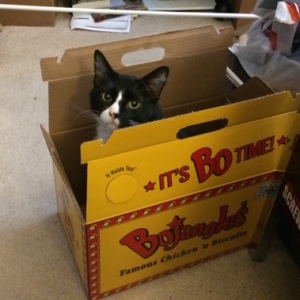
See? That’s my cat. In a Bojangle’s box. He’s fucking adorable.
So here are the guidelines, pulled straight from our website as of today, March 22, 2017.
All submissions should be sent to info@falstaffbooks.com with a query letter and the requested sample, sized by format as indicated above. Should your work be accepted by another publisher during the 45-60 day period of your manuscript’s consideration, we would appreciate you letting us know.
If I have met you personally, you can send it to my email address. Otherwise, use the main email address. This is because all the editors have access to it and everyone checks that email inbox. That means that your manuscript gets seen and evaluated faster. It helps us be more efficient.
Send a query letter. I want to know a little something about you and the book before I dive in. There are a lot of websites out there that will teach you how to write one. They won’t tell you this – if you don’t include anything, I won’t read the submission. I’ll email you a form rejection letter and move along. If you don’t care enough about the book to write a query to get me excited about the book and about working with you, then I don’t care enough to read your query letter. Also, without a query letter it’s just a random email with an attachment. And those get deleted immediately.
Simultaneous submissions are fine, but if the book gets picked up, let me know. That’s just basic courtesy.
Please format your work in Standard Manuscript Format, which is:
- MSWord documents ONLY (.doc and .docx format)
- I fucking hate RTF Files. I’m getting old and I need to be able to adjust the size of a document easily. Word lets me do that. I don’t write in Word. I don’t care what you write in. The publishing world works in MSWord, so fucking get a copy of it. Some of the free stuff out there is great, but some of it the formatting looks like a pile of assholes when you transfer it to Word, so you better be able to look at it in Word before you send it. And if you can look at in Word, why not just make it there?
- 12pt. Times New Roman Font
- Yes, goddammit, you have to use the right font. I find serif fonts easier to read, and 12-point is about the smallest my old eyes ca handle. When your business card says “Publisher” on it, you can set the rules to make your life easier.
- 1-inch Margins
- It makes things look uniform, and gives me some idea of how long your paragraphs will appear on the printed page. It’s a small thing, but the idea of blocks of grey space is something I think about, and at this point if a submission follows traditional guidelines, I get a sense of how dense the text is.
- Double-Space between lines
- I mentioned I’m getting old, right? I never expected to survive my twenties, and there are plenty of people who hung out with me who also didn’t expect it. But since I did, and now I’m in my forties, I’m fucking blind. Double-spaced used to be for manual edits, now it’s for old bastards who need help reading.
- DO NOT INDENT MANUALLY
- We make a shit ton of ebooks. Ebooks hate hard tabs. So don’t fucking use hard tabs in your document. Gain some facility with the rod processing software and set your preferences to indent the first line of each new paragraph. It’s one of the things you can do when you’re fixing the font and spacing. Someone is going to have to go back through and do this anyway, so you may as well do it from the start. I sure as fuck am not going to do it, so if you send me a manuscript full of manual indents (hard tabs), you’re getting the thing back with a note that says “get rid of all the fucking hard tabs” before edits.
- Number your pages in the UPPER-RIGHTHAND CORNER starting on the SECOND PAGE
- Help me keep track of where I am. Again, it’s something you set up at the beginning of a document.
- Please include your name, email, address, and phone number on the COVER PAGE
- I would like to know how to get in touch with you, just in case you’re fucking amazing.
- CHAPTERS must start on a NEW PAGE.
- Because that’s how fucking books work. Have you ever fucking read one?
Finally, please wait 45-60 days for our response to your submission. We will request more of your work or send a rejection during that time. Due to the large number of submissions we receive we will be unable to send a personal rejection with each submission, though we will do our best to do so when it comes to novels and novellas.
Those are our guidelines. They’re pretty simple, right? Just follow those, and your shit gets read. Don’t follow them, and you show me that you’re a special fucking snowflake that doesn’t take direction well. It speaks to how you will handle edits, and whether or not you’re a pain in the ass. Here’s a tip – working with a publisher is a multi-year engagement, and nobody wants to work with a pain in the ass for very long. So don’t suck. Put your best foot forward, because your submission is like a first date, and nobody farts at the table on the first date.
So take a fucking Bean-o and enjoy the lobster bisque.




 Weird Westerns are a sub-genre of speculative fiction. I was first introduced to this sub-genre when I lived in the Southwest and attended MilehiCon. While there, I met David B. Riley and his publishing company, Science Fiction Trails. He and Laura Givens were working on an anthology of weird westerns. Excited by the idea of creating a diverse populous in the old west, I went home and wrote a short story. I submitted “Justice” to them and it was accepted. The story appeared in Six Guns Straight from Hell.
Weird Westerns are a sub-genre of speculative fiction. I was first introduced to this sub-genre when I lived in the Southwest and attended MilehiCon. While there, I met David B. Riley and his publishing company, Science Fiction Trails. He and Laura Givens were working on an anthology of weird westerns. Excited by the idea of creating a diverse populous in the old west, I went home and wrote a short story. I submitted “Justice” to them and it was accepted. The story appeared in Six Guns Straight from Hell.

